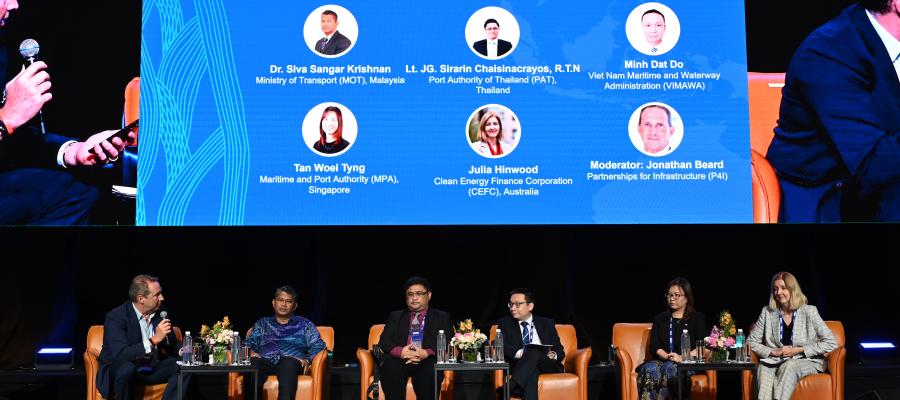If you are interested in partnering with us, please get in touch. Using P4I's flexible, innovative tools and diverse global expertise, we are confident we can design a response that is tailored to your needs.


Without action, greenhouse gas emissions from shipping could quadruple by 2050. Southeast Asia sits at the centre of this challenge, serving as both a major contributor to maritime emissions and a crucial catalyst for change through its strategic trade routes and ten key ports.
With the right partnerships, policies, and investments, the maritime sector can become a driver of sustainable, inclusive growth.
Held on 17 July 2025 during Malaysia Maritime Week, the ASEAN Future of Maritime Conference brought together regional leaders to chart a different course. Co-hosted by the Ministry of Transport Malaysia, Malaysia Shipowners’ Association, the ASEAN Secretariat, and the Australian Government through Partnerships for Infrastructure (P4I), the conference marked a key moment for advancing Southeast Asia’s maritime decarbonisation agenda.
With support from P4I, the conference created space for ASEAN and Australian partners to share insights on what maritime decarbonisation looks like in practice, from updating regulations and piloting green fuel infrastructure, to planning for long-term workforce needs. Across sessions, the focus was on turning high-level ambition into coordinated, practical action.
The conference explored three core themes shaping Southeast Asia’s maritime transition:
Green shipping partnerships are helping ASEAN countries align regulation, attract investment, and accelerate decarbonisation efforts. Sessions focused on how these partnerships can turn ambition into implementation through rules, pilots, and coordination mechanisms that work in practice and not just policy targets.
Speakers pointed to examples like Malaysia’s Green Bunkering Roadmap, which balances phased regulation with international alignment and safety standards, and Australia’s corridor development with Singapore, where early engagement with port authorities and industry was critical to feasibility. Across the board, participants emphasised that regional momentum depends on frameworks that are both aligned and usable, grounded in operating realities and supported by those expected to deliver them.
As ASEAN ports prepare for the use of alternative marine fuels, ensuring safe handling has become a critical enabler of decarbonisation and a necessary response to the operational and safety risks these fuels present. The sessions made clear that managing this shift requires more than new equipment but regulatory clarity, workforce planning, and strong operational coordination.
Case studies from the Port of Tanjung Pelepas and insights from the Global Port Safety project showed how ports are already updating emergency protocols and retraining staff for the realities of ammonia, methanol, and other alternative fuels, while Australia’s contributions highlighted the role of national standards and port-level planning in ensuring safe operations at scale. Speakers stressed that regional consistency will be critical to manage risk and ensure ports aren’t left behind as fuel standards and vessel technologies evolve.
Embedding social inclusion, workforce safety, and climate resilience into the shift to low-emissions shipping is essential to its long-term success. Sessions across the third theme focused on ensuring the transition is equitable, safe, and resilient, with social inclusion and workforce planning embedded from the start.
Speakers emphasised that issues like gender equality, disability inclusion, and occupational safety need to be considered alongside emissions goals and not after the fact. Australia’s Clean Energy Finance Corporation shared how inclusive planning and social safeguards can improve investment outcomes, while panellists from Malaysia, the Philippines, and the International Chamber of Shipping underscored the importance of data, labour engagement, and climate adaptation in infrastructure planning. Across the region, there was broad consensus: long-term success depends on transitions that are not only low-emissions, but also fair, safe, and future-proof.
The ASEAN Future of Maritime Conference made clear that maritime decarbonisation is already underway and that inclusive, coordinated planning will be key to its success. From regulatory design and infrastructure readiness to workforce transition and investment strategy, the sessions highlighted both the complexity of the task and the value of regional cooperation.
By creating space for practical exchange between ASEAN and Australian partners, the conference reinforced a shared commitment to sustainable growth and laid the groundwork for continued collaboration on building a low-emissions, resilient maritime sector across Southeast Asia.
Read more about P4I’s work to accelerate maritime decarbonisation in Southeast Asia: Accelerating maritime decarbonisation in Southeast Asia
If you are interested in partnering with us, please get in touch. Using P4I's flexible, innovative tools and diverse global expertise, we are confident we can design a response that is tailored to your needs.
